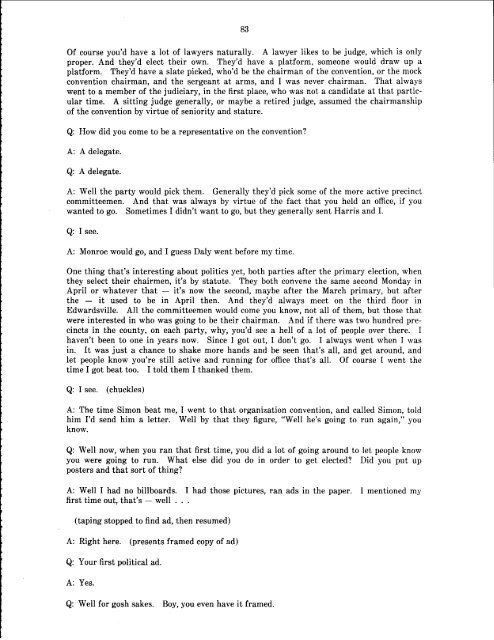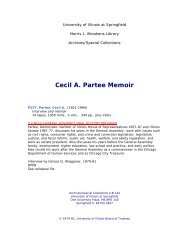Leland J. Kennedy Memoir - University of Illinois Springfield
Leland J. Kennedy Memoir - University of Illinois Springfield
Leland J. Kennedy Memoir - University of Illinois Springfield
Create successful ePaper yourself
Turn your PDF publications into a flip-book with our unique Google optimized e-Paper software.
Of course you'd have a lot <strong>of</strong> lawyers naturally. A lawyer likes to be judge, which is only<br />
proper. And they'd elect their own. They'd have a platform, someone would draw up a<br />
platform. They'd have a slate picked, who'd be the chairman <strong>of</strong> the convention, or the mock<br />
convention chairman, and the sergeant at arms, and I was never chairman. That always<br />
went to a member <strong>of</strong> the judiciary, in the first place, who was not a candidate at that particular<br />
time. A sitting judge generally, or maybe a retired judge, assumed the chairmanship<br />
<strong>of</strong> the convention by virtue <strong>of</strong> seniority and stature.<br />
Q: How did you come to be a representative on the convention?<br />
A: A delegate.<br />
Q: A delegate.<br />
A: Well the party would pick them. Generally they'd pick some <strong>of</strong> the more active precinct<br />
committeemen. And that was always by virtue <strong>of</strong> the fact that you held an <strong>of</strong>fice, if you<br />
wanted to go. Sometimes I didn't want to go, but they generally sent Harris and I.<br />
Q: I see.<br />
A: Monroe would go, and I guess Daly went before my time.<br />
One thing that's interesting about politics yet, both parties after the primary election, when<br />
they select their chairmen, it's by statute. They both convene the same second Monday in<br />
April or whatever that - it's now the second, maybe after the March primary, but after<br />
the - it used to be in April then. And they'd always meet on the third floor in<br />
Edwardsville. All the committeemen would come you know, not all <strong>of</strong> them, but those that<br />
were interested in who was going to be their chairman. And if there was two hundred precincts<br />
in the county, on each party, why, you'd see a hell <strong>of</strong> a lot <strong>of</strong> people over there. I<br />
haven't been to one in years now. Since I got out, I don't go. I always went when I was<br />
in. It was just a chance to shake more hands and be seen that's all, and get around, and<br />
let people know you're still active and running for <strong>of</strong>fice that's all. Of course I went the<br />
time I got beat too. I told them I thanked them.<br />
Q: I see. (chuckles)<br />
A: The time Simon beat me, T went to that organization convention, and called Simon, told<br />
him I'd send him a letter. Well by that they figure, "Well he's going to run again," you<br />
know.<br />
Q: Well now, when you ran that first time, you did a lot <strong>of</strong> going around to let people know<br />
you were going to run. What else did you do in order to get elected? Did you put up<br />
posters and that sort <strong>of</strong> thing?<br />
A: Well I had no billboards. I had those pictures, ran ads in the paper. I mentioned my<br />
first time out, that's - well . . .<br />
(taping stopped to find ad, then resumed)<br />
A: Right here. (presents framed copy <strong>of</strong> ad)<br />
Q: Your first political ad.<br />
A: Yes.<br />
Q: Well for gosh sakes. Boy, you even have it framed.
















